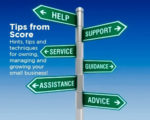Growing Your Small Business
 Question: I have been in business for about give years and profitable for three. Now that I am established, I want to grow my business. Any tips?
Question: I have been in business for about give years and profitable for three. Now that I am established, I want to grow my business. Any tips?
Answer: Now that you are beyond being a fledgling venture, there is no specific formula or magic recipe to follow in taking your business to the next level. A lot of growth strategy has to do with whether you make and sell a product or offer a service. It has to do with the general industry trends in which you function. Is your sector growing, stable or in decline? The most important element in growing your small business is a growth plan. Just like you had a plan for starting and launching your business, you will need a plan for growing your business. And, it starts with growth objectives. Is its geographic expansion, i.e., across the bridges or sales volume growth from your current market? What milestones do you want to reach and by when?
Here are some specifics you want to keep in mind as you plan your enterprise growth.
Stay focused on your business mission. When attempting to grow a business, it is tempting to branch out into unknown waters. Try to stay focused on who you are, what you do and what is your core offering. When your mission becomes unfocused, you tend to make costly errors.
Have the right team in place. Hiring the right people is a great place to start. You need to assure that you have the right skills and a firm foundation of culture in place before attempting to grow. In creating your growth plan, consider what skills are needed to assist you in reaching your formalized objectives? When looking beyond a solopreneur organization, you need staff that are multi-taskers and are not afraid to get their hands a little dirty to make the leap to the next level of sales or production.
Determine what your source for growth revenue will be and focus on it. Most businesses look to increased revenue to grow their businesses by finding and selling their new products or services to new buyers. It is more productive to grow your business through existing customers who are already sold on you and your business and sell them more of what you are offering.
Focus on your established market and established channels.
Reduce your risks. All business is risky. And risk is an inevitable part of growing an existing business. However, you must know what the risks are and know how to limit them, so the downsides are controlled. Some of the risk management might be through your insurance broker, but others are through careful, planned expansion. Employ the adage, “think twice, then act,” or as strategist Peter Johnson advises, “Accuracy before momentum.”
Be adaptable and flexible. There are times when you will need to switch directions. Your plan just might hit a “bump in the road” that is beyond your control, so you need to be adaptable and flexible and change with the internal and external environmental shifts. You might always have a plan “B” in your pocket to use when the need arises.
Always have a Plan B. Just like in the start-up phase, in the growth phase of business, you never know what will change your direction due to unforeseen situations. Some are obstacles. Some are opportunities. Regardless, one of these situations will occur, and you will need a plan that allows you to pivot. With a Plan B, you have the ability to move in a different direction or adjust your strategies and tactics in managing the growth of your business.
Focus on the customer and their experience. What people remember most about their interaction with you is the experience. Many products today are viewed as commodities with little differentiation. Perceptions about how you engaged, serviced, and reacted to them will help you grow your business through word-of-mouth promotion. When you see a need, go for it. The most successful small businesses are the ones that capitalizes on opportunities that are presented to them. If you listen to your customers not only will they be committed to you, but you will find what the next opportunity for your business will be since they will tell you. If you are not listening to your customers, you may not get to the next stage in growth.
Become a life-long learner. Invest in yourself. Take courses at Cape Cod Community College’s Center for Corporate and Professional Education. Enroll in a workshop offered by Cape Cod SCORE and Coastal Community Capital, co-hosted by your local Chambers of Commerce. Read industry magazines and stay tuned into e-zines that will give you greater insight into business growth options. Participate in online discussions via LinkedIn groups. All it takes is 30 or 45 minutes per day to get new ideas about solving your growth issues
Growing an existing business is not for the faint at heart. It takes a plan, persistence, ingenuity, and determination.











